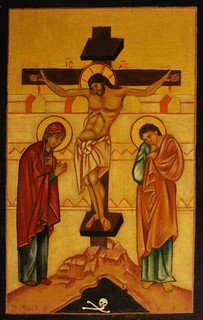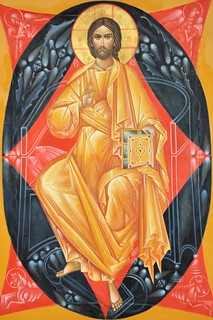 Therefore, if any one is in Christ, he is a new creation; the old has passed away, behold, the new has come. All this is from God, who through Christ reconciled us to himself and gave us the ministry of reconciliation; that is, in Christ God was reconciling the world to himself, not counting their trespasses against them, and entrusting to us the message of reconciliation. So we are ambassadors for Christ, God making his appeal through us. We beseech you on behalf of Christ, be reconciled to God. For our sake he made him to be sin who knew no sin, so that in him we might become the righteousness of God. Working together with him, then, we entreat you not to accept the grace of God in vain. (2 Corinthians 5:17-6:1)
Therefore, if any one is in Christ, he is a new creation; the old has passed away, behold, the new has come. All this is from God, who through Christ reconciled us to himself and gave us the ministry of reconciliation; that is, in Christ God was reconciling the world to himself, not counting their trespasses against them, and entrusting to us the message of reconciliation. So we are ambassadors for Christ, God making his appeal through us. We beseech you on behalf of Christ, be reconciled to God. For our sake he made him to be sin who knew no sin, so that in him we might become the righteousness of God. Working together with him, then, we entreat you not to accept the grace of God in vain. (2 Corinthians 5:17-6:1)
We are to work together with God for our salvation. In the days of Noah, God told Noah to build an ark for the salvation of the world. God didn’t build it for Noah. Noah had to co-operate with God and do his own share of the work. This is an image of life in the Church. God commands us to go into all the world, but God doesn’t do that work for us. We have to do what God commanded us to do. But we also must always realize our place in the plan of salvation – we are essential to the plan and the plan is for us, yet we have to discern the plan and carry it out. We are not God. We are to work with God – synergy. Our plans as church are not merely human, for God shows us the way and then lets us choose to follow Him. Salvation is not merely humans making the best human choices possible, for it always involves the full being of God.
 “The Church is and must remain ‘of God’ and not ‘of man.’ That is, humans were not placed in stewardship of the Church in order to invoke their will for where they see the Church going but rather to guide the Church into the will of God.[…] The conception of the Church as an institution represents the hijacking of the Church by humans for their own end. Bishop Meletios notes, ‘The beginning and end of every act of God is the salvation of the world. We must place the weight of our attention on this, not in the work of institutions.’ The hope of humanity cannot be placed in the Church but only in God. If the Church is only an institution that acts like any other institution and can be evaluated like any other institutions, then it will fail.” (Stephen R. Lloyd-Moffett, Beauty for Ashes, pp 147, 149)
“The Church is and must remain ‘of God’ and not ‘of man.’ That is, humans were not placed in stewardship of the Church in order to invoke their will for where they see the Church going but rather to guide the Church into the will of God.[…] The conception of the Church as an institution represents the hijacking of the Church by humans for their own end. Bishop Meletios notes, ‘The beginning and end of every act of God is the salvation of the world. We must place the weight of our attention on this, not in the work of institutions.’ The hope of humanity cannot be placed in the Church but only in God. If the Church is only an institution that acts like any other institution and can be evaluated like any other institutions, then it will fail.” (Stephen R. Lloyd-Moffett, Beauty for Ashes, pp 147, 149)

 The
The